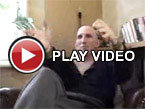Chris Watson, "El Tren Fantasma"
 Roughly ten years ago, BBC's Radio 4 sent Chris Watson to Mexico to record one of the final continuous cross-country trips for Mexico's passenger rail system.  The resultant album is a narrative collage that uses those recordings to aurally recreate that unique and memorable journey.  I'd definitely say he succeeded quite impressively at that specific technical objective, but that doesn't necessarily translate into a great album.
Roughly ten years ago, BBC's Radio 4 sent Chris Watson to Mexico to record one of the final continuous cross-country trips for Mexico's passenger rail system.  The resultant album is a narrative collage that uses those recordings to aurally recreate that unique and memorable journey.  I'd definitely say he succeeded quite impressively at that specific technical objective, but that doesn't necessarily translate into a great album.
El Tren Fantasma ("The Ghost Train") borrows its title from a 1927 Mexican silent film, but it explicitly draws its primary inspiration from Pierre Schaeffer, whose train-based 1948 piece "Étude aux Chemins de Fer" was one of the first ever musique concrète compositions (unknowingly predated by only Halim El-Dabh's "The Expression of Zaar").  A dedication to Schaeffer makes perfect sense here, as El Tren Fantasma is essentially an extension of what Pierre did in 1948, but with the benefit of modern recording and editing equipment.  Sixty years of technological advances make an enormous difference though: Schaeffer was able to create a 3-minute rhythmic collage of train sounds, but Watson has condensed the sounds of an entire month-long journey into a single evocative and vibrant hour that doesn't miss a single detail.
Obviously, the focus is very much on railroad sounds, but Watson also captures the ambiance of the various lonely stops along the way (right down to the insects and the breeze).  Those touches are often among the album's highlights, as Chris has a long history of expertly capturing the subtle sounds of the natural world.  That said, Watson's most impressive recording and editing feats are reserved for the train itself, especially the way the rumbling and clacking changes as the train goes over a bridge or plunges into a tunnel.  Even when the nothing unusual is happening, however, the normal rumble and squeal of the train can be a striking and almost physical experience–especially with headphones.
Unfortunately, one of the album's greatest assets is also perversely its greatest handicap: its vibrancy and immediacy.  Watson has always created enveloping and amazingly life-like soundworlds, but none of his albums have been as bluntly attention-grabbing as this one: they just pleasantly and exotically changed my aural surroundings.  El Tren Fantasma, on the other hand, demanded my complete focus, but once it had me, it never went as far or as deep as I wanted it to go.
That unexpected problem unexpectedly surfaced for me due to "El Divisidero," a piece in which Chris unexpectedly moves from pure vérité into music by building a rhythm from heavily-processed clacking and weaving together something that sounds like a warm bed of droning synth.  It isn't spectacular or anything, but it made me wonder why Watson was willing to take those liberties, but didn't go further and turn the trip into something increasingly strange and phantasmagoric.  That would certainly make the album's title seem more apt (though I understand that sounds disconnected from their source could also be perceived as "ghosts").
Once I had that realization, it became very difficult to be content with an uneventful trip from station to station, no matter how perfectly rendered it was.  Also, there is no denying the fact that a long train ride through Mexico cannot be movingly recreated without some sort of visual component.  No one takes a train through Copper Canyon because they are eager to hear how it will sound.
While it is certainly relevant and necessary, it nevertheless feels a bit unfair to critique El Tren Fantasmo for the limitations of sound or for what I think it could've been.  Chris Watson set out to do two very specific things: document the last days of one of the world's most singular train rides and pay homage to one of electronic music's greatest visionaries.  He succeeded in both objectives beautifully.  El Tren Fantasmo may not be a triumph of composition, but it is an unqualified masterpiece in the realms of both recording and sound editing.  It is difficult to imagine a sharper and more instantly gratifying collage of field recordings than this one.
Samples:
 
 



